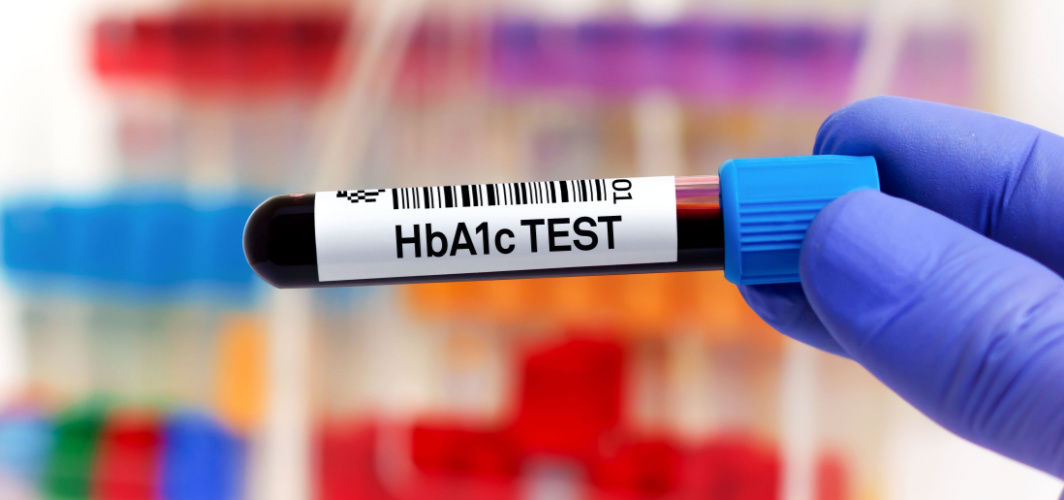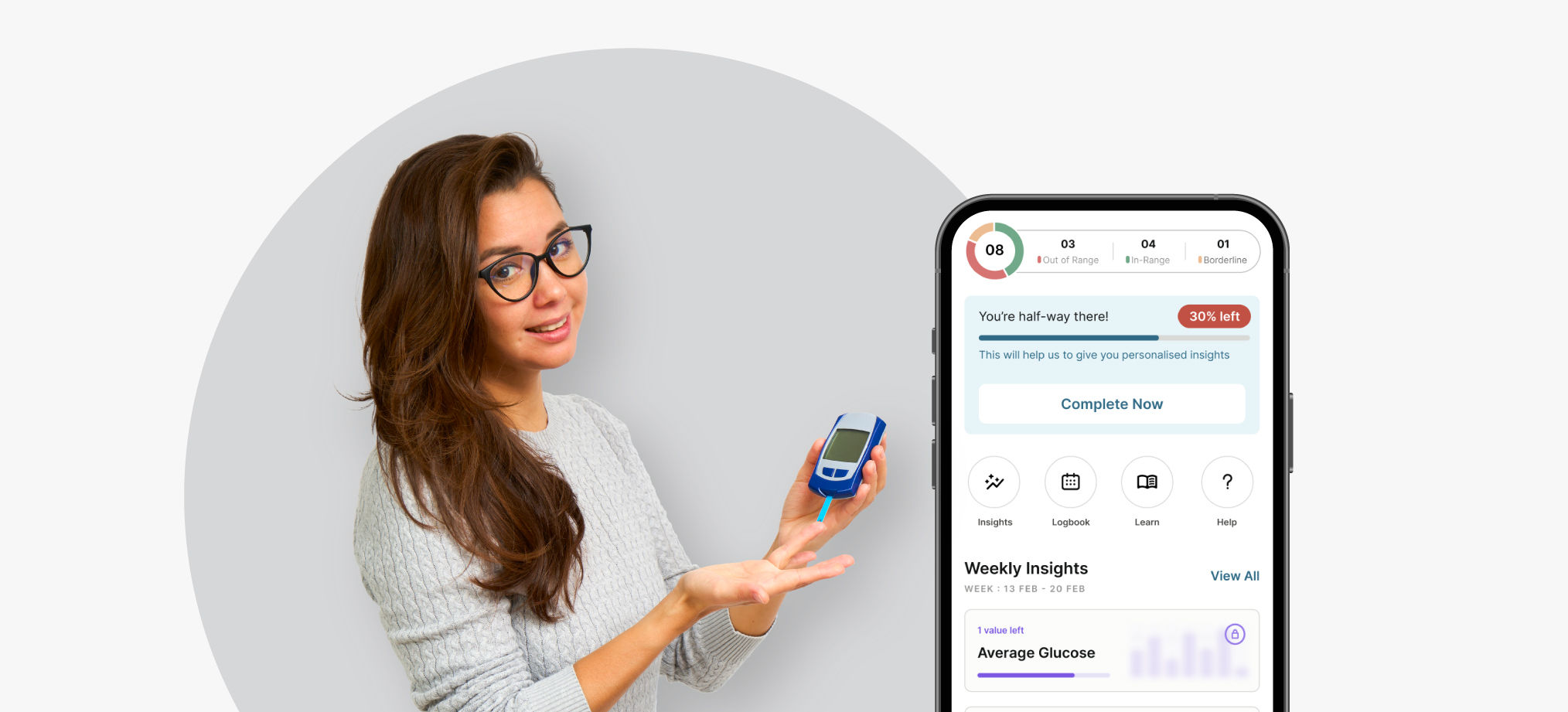Diabetes Management
How To Bring Down The HbA1c Level?
4 min read
By Apollo 24|7, Published on - 17 January 2023, Updated on - 07 August 2024
Share this article
0
0 like

Rather than getting fasting and post-meal blood sugar levels checked, nowadays doctors often prescribe the HbA1c test. The HbA1c blood test primarily evaluates the three-month average blood sugar level of an individual. However, it can also be used to diagnose diabetes mellitus and assess a patient's glycaemic control if they already have been diagnosed. Keeping your HbA1c level within the normal range is the best way to prevent diabetes-related complications.
How do HbA1c levels determine sugar levels in the blood?
Haemoglobin in your red blood cells binds to glucose present in your blood. The HbA1c blood test calculates the amount of glucose bound to the haemoglobin. Since red blood cells typically have a lifespan of about three months, the test shows the average blood glucose level over the previous three months. If your blood glucose levels have been high over the past few weeks, your HbA1c test results will also be higher than normal.
What is the normal HbA1c level?
Normal HbA1c values range between 4% and 5.6% for people without diabetes. You have pre-diabetes and a higher likelihood of developing diabetes if your HbA1c levels lie between 5.7% to 6.4%. Diabetes is diagnosed when levels reach 6.5% or higher.
How To Lower hba1c Levels?
In diabetic patients, lower HbA1c values signify effective blood sugar management. However, people with high or borderline HbA1c levels may wonder how can they bring their HbA1c levels down. Here are a few lifestyle changes and treatment plans that may help you keep your HbA1c levels in the normal range:
- Plan a diet with low glycaemic index foods such as green vegetables, raw carrots, beans, chickpeas and lentils to regulate blood glucose levels.
- Be mindful of the portion sizes of the food.
- Start a good exercise regime to manage weight.
- Eat a fibre-rich diet to control sugar spikes.
- Take your oral hypoglycaemic medications as prescribed.
- Track your blood glucose levels with a glucometer at home.
- Consult your doctor regularly and get your lab tests done for HbA1c as and when prescribed by your doctor.
Regulating your HbA1c level is key to successful diabetes management. Making certain lifestyle changes, such as eating a balanced diet, especially low glycaemic foods, exercising, and taking medications regularly can help to effectively control HbA1c levels. If you are diabetic, make sure to consult a doctor and a nutritionist before making any changes to your diet and exercise routine.
FAQs
1. Is the HbA1c test better than other glucose tests?
Yes, HbA1c levels give a better picture of blood glucose control over three months, unlike other blood glucose tests which only provide a one-time status of sugar level in the body.
2. Which foods reduce HbA1c?
A diet devoid of refined carbohydrates and rich in protein, healthy fats, whole grains and fibre can have a positive effect on HbA1c levels.
3. What is the HbA1c test price?
The HbA1c test price varies among different laboratories across different regions. Usually, the test price ranges between INR 300 and INR 1000 across different states in India.
4. How many times do you have to take an HbA1C blood test?
For a healthy or pre-diabetic person, taking the HbA1c blood test twice a year is sufficient. However, if you are diabetic taking the test quarterly or 4 times a year is recommended.
5. How to bring HbA1c down?
HbA1c levels can be brought down by following a strict diabetes-friendly regimen that includes cutting down on sugary foods, exercising regularly, and taking prescribed medications regularly.
Talk to a doctor to get the best guidance.
Consult An Apollo Diabetologist
You can also try the Apollo 24|7 Diabetes Self-Management Tool to log your sugar values, track patterns, know all about food nutrition and more.
Medically reviewed by Dr Sonia Bhatt.
Diabetes Management
Consult Top Diabetologists
View AllLeave Comment
Recommended for you
.jpg?tr=q-80)
Diabetes Management
Preventing Diabetic Ulcers: Strategies for Foot Health
Effective foot care is crucial for individuals with diabetes. Understanding and implementing strategies like daily foot checks, comfortable footwear, blood sugar control, regular moisturisation, and more can help prevent diabetic ulcers and maintain overall foot health. The Apollo Super 6 programme offers comprehensive guidance on diabetes management, making your health journey smoother and more manageable.

Diabetes Management
5 Best Exercises To Manage Diabetes
Five exercises that are best for managing diabetes are walking, strength training, swimming, yoga and High-Intensity Interval Training (HIIT). Walking can help lower blood sugar levels, make your heart healthier, and help you manage your weight. Strength training like squats, lunges, presses, rows, and planks can improve insulin sensitivity and cardiovascular health. Swimming keeps your overall body fit, while yoga can help reduce stress and anxiety. HIIT can enhance insulin utilization and cardiovascular fitness.

Diabetes Management
Manage Your Diabetes Like A Pro With Apollo 24|7's 12-Week EMPOWER Programme
Diabetes is one of the most common and widespread lifestyle diseases, affecting millions of people worldwide. Keeping the condition under control is a very challenging task. The Diabetes Management Programme by Apollo 24|7 can help you learn how to manage your condition on your own. Read on to learn how.
Subscribe
Sign up for our free Health Library Daily Newsletter
Get doctor-approved health tips, news, and more.
Visual Stories

8 Fruits That are Incredibly Healthy for Diabetes
Tap to continue exploring
Recommended for you
.jpg?tr=q-80)
Diabetes Management
Preventing Diabetic Ulcers: Strategies for Foot Health
Effective foot care is crucial for individuals with diabetes. Understanding and implementing strategies like daily foot checks, comfortable footwear, blood sugar control, regular moisturisation, and more can help prevent diabetic ulcers and maintain overall foot health. The Apollo Super 6 programme offers comprehensive guidance on diabetes management, making your health journey smoother and more manageable.

Diabetes Management
5 Best Exercises To Manage Diabetes
Five exercises that are best for managing diabetes are walking, strength training, swimming, yoga and High-Intensity Interval Training (HIIT). Walking can help lower blood sugar levels, make your heart healthier, and help you manage your weight. Strength training like squats, lunges, presses, rows, and planks can improve insulin sensitivity and cardiovascular health. Swimming keeps your overall body fit, while yoga can help reduce stress and anxiety. HIIT can enhance insulin utilization and cardiovascular fitness.

Diabetes Management
Manage Your Diabetes Like A Pro With Apollo 24|7's 12-Week EMPOWER Programme
Diabetes is one of the most common and widespread lifestyle diseases, affecting millions of people worldwide. Keeping the condition under control is a very challenging task. The Diabetes Management Programme by Apollo 24|7 can help you learn how to manage your condition on your own. Read on to learn how.

